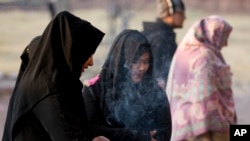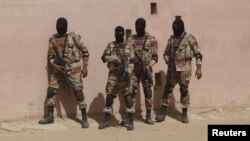Pakistan's Tehreek-i-Taliban (TTP) has recently published its first women's magazine, urging potential female jihadists to join the ranks of the militant group and to devote themselves to the cause of jihad.
The magazine, Sunnat-e-Khaula (The Way of Khaula), is named after a young female fighter during the time of the Prophet Muhammad, according to local media accounts in Pakistan. The magazine is another effort on part of the country's Taliban to renew their efforts to reach out to millions of Pakistani women and recruit them to their militant cause.
In an advice column of the magazine, the militant group urges women to "distribute literature reflecting on the obligation of jihad, arrange physical training classes for sisters. Learn how to operate simple weapons. Learn the use of grenades."
While the magazine is accessible to only a handful of people, the news of its launch has been widely circulated on social media platforms in Pakistan, amplifying its reach and making its core content available online to a vast number of Pakistani youth.
Power of digital media
Some experts warn that, contrary to popular belief, middle-class students with access to digital media are more prone to radicalization than those of the madrasas.
The Pakistani Taliban, which is losing territory because of various Pakistani military operations, are increasingly resorting to using varied media platforms to promote and propagate their ideology.
"Social media is an effective tool in the hands of extremists. TTP launching of a magazine for women is important in many ways," professor Khadim Hussain, an expert on militancy in the Afghanistan and Pakistan region, told VOA.
"They are using an effective model used by Islamist political party Jamate Islami and extremist outfit Hizbut Tehrir to reach out to the new generation," said Hussain, author of The Militant Discourse: Religious Militancy in Pakistan.
Influence of women
Hussain said he thought TTP's magazine wanted to capitalize on the influence that women have in their households, which he argued is something that is not easily visible.
"It provides an expanded reach without tracing the jihadi footprints easily," he said.
Maria Sultan, a defense analyst in Pakistan, agreed with Hussain's analysis, adding that the Taliban have a reason to target the country's female population.
"Taliban believe by capturing women's attention they can re-establish their network that has been destroyed by the Pakistan army through several military operations in the Northwest region in recent years," Sultan said.
"Pakistan will have to implement [its] National Action Plan fully to stop Taliban's' reach to the masses," she added.
Pakistan's National Action Plan, a comprehensive 20-point strategy devised in 2015 to fight extremism, calls for "strict action to be taken against literature, newspapers and magazines promoting hatred, extremism, sectarianism and intolerance" in the country.
Dangerous to youth
Qibla Ayaz, former dean of the faculty of Islamic and Oriental Studies at the University of Peshawar, called the TTP magazine launch a dangerous development for the youth of the region, "since the new generation is all there on the social media. [The Islamic State] militant outfit has adopted the same social media strategy for its recruitment, and it seems to be a problem here, too."
He said he thought the problem was not limited to Pakistan and called for a counterextremism narrative across the Muslim world to counter it.
"We have not developed a well-constructed counterextremism narrative," he said. "I think all the leading voices around the Muslim world need to come together and come up with a joint strategy against it [extremism]."
The magazine reportedly has articles about prominent Muslim women from the early era of the emergence of Islam, sharing their experiences and advising women of faith to fully implement the code of Islam in their lives.
The magazine interviewed a woman who said she was the wife of TPP leader Fazlullah Khorasani. She advocated for the benefits of early-age marriage and defended her own at age 14 to Khorasani.
Pakistani claims
Since 2014, Pakistan has conducted large-scale counterterrorism operations in its restive Northwest region in an attempt to eradicate Taliban influence and militancy. It claims its troops have successfully eliminated and dismantled terrorism and militant infrastructure in the region.
U.S. and Afghanistan officials, however, have long accused Pakistan of being selective in its crackdown on militants. They claim Islamabad targets only groups, including TTP, that pose a threat to Pakistan's interests and overlook other militants who are using the country's territory to plan attacks on Afghanistan and India. Pakistan has denied those allegations.
In the 2016 edition of its annual Country Reports on Terrorism, the U.S. State Department criticized Pakistan for failing to take action against the Haqqani network and the Afghan Taliban. When reached this week, a department spokesperson declined to comment on the Taliban's new outreach to women.







